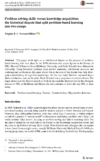Abstract
This paper sheds light on an intellectual dispute on the purpose of problem-based learning that took place in the 1970s between two major figures in the history of PBL: Howard S Barrows from McMaster University and Henk Schmidt from Maastricht University. Using historical evidence from archive materials, oral history accounts and contemporary publications, the paper shows that at the core of the dispute was their divergent understanding of cognitive psychology. On the one hand, Barrows espoused hypothetico-deduction, and on the other, Henk Schmidt was a proponent of constructivism. The paper shows how the dispute played out both in the scientific literature and in the divergent practice of PBL at McMaster and Maastricht and continues to affect the way PBL is done today.



Responses